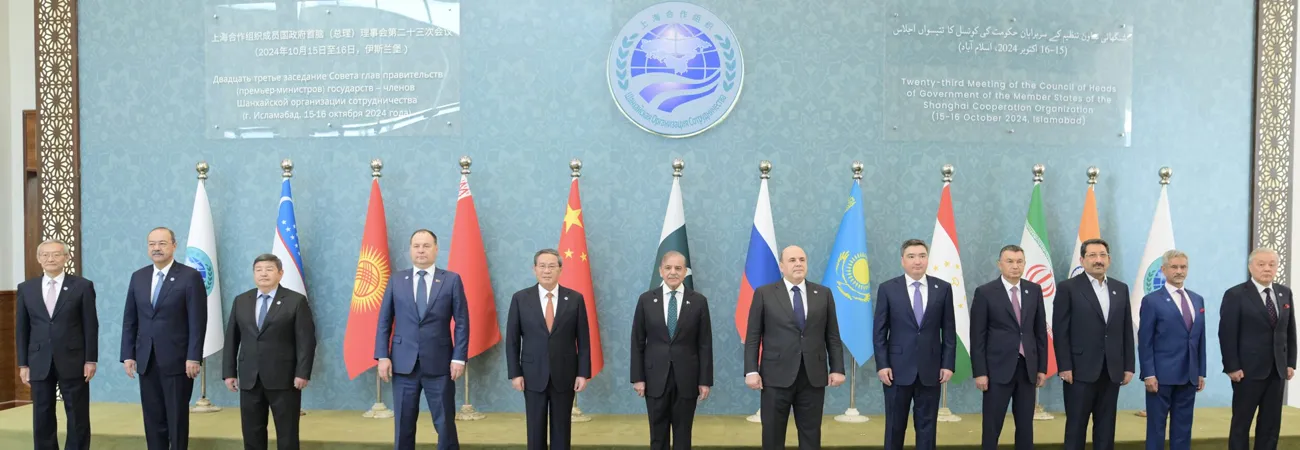i NEWS PAKISTAN
The heads of delegation from Shanghai Cooperation Organization (SCO) member states on Wednesday reaffirmed their commitment to peacefully resolving disputes through dialogue and consultations besides emphasizing the importance of strengthening cooperation across various sectors, including politics, security, trade, finance, and cultural ties, to build a prosperous, peaceful, safe, and ecologically sustainable planet. In a joint declaration issued at the conclusion of the two-day SCO Council of Heads of Government (CHG) meeting held here, the heads of delegations called for sustainable and inclusive economic growth of member states by optimizing the region’s potential in areas such as green development, digital economy, trade, e-commerce, finance and banking, investment, high technology, start-ups and innovation, poverty alleviation, health care, including traditional and folk medicine, agriculture, industry, transport, logistics connectivity, energy, including renewable energy, communications, science and technology, environment and climate change.
The heads of delegations, reaffirming their desire to ensure stable economic and social development in the SCO region, noted the importance of implementing the SCO Economic Development Strategy for the period up to 2030 and the Program of Multilateral Trade and Economic Cooperation of the SCO member states. They stressed the need for coordinated efforts through the mechanisms of relevant cooperation in order to implement the respective action plans. The event was chaired by Prime Minister Muhammad Shehbaz Sharif and was attended by the leaders from the SCO member states including China’s Premier of the State Council Li Qiang, Prime Minister of Belarus Roman Golovchenko, Prime Minister of Kazakhstan Olzhas Bektenov, Russian Prime Minister Mikhail Mishustin, Tajik Prime Minister Kohir Rasulzoda, Uzbek Prime Minister Abdulla Aripov, Kyrgyzstan’s Chairman of Ministers’ Cabinet Zhaparov Akylbek, Trade Minister of Iran Seyyed Mohammad Atabek, and Indian External Affairs Minister Subrahmanyam Jaishankar.
Besides, Mongolia is participating in the summit as an Observer State being represented by Prime Minister Oyun-Erdene Luvsannamsrai and Turkmenistan as a Special Guest represented by Deputy Chairman of the Cabinet of Ministers Rashid Meredov. Among other dignitaries attending the moot include SCO Secretary-General Zhang Ming, Director of Executive Committee SCO Regional Anti-Terrorist Structure (RATS) Ruslan Mirzayev, Chairman of the Board of SCO Business Council Atif Ikram Shaikh and Chairman of the Council of SCO Interbank Union Marat Yelibayev. The heads of delegation noted significant shifts in the global economy due to advancements in technology and e-commerce, expressing concern over reduced investment and disrupted supply chains caused by protectionist measures and trade barriers. Opposing unilateral sanctions and trade restrictions, the delegations emphasized the need for a multilateral trading system to support global sustainable development. Belarus, Iran, Kazakhstan, Kyrgyzstan, Pakistan, Russia, Tajikistan, and Uzbekistan reiterated their support for China’s One Belt, One Road initiative, highlighting ongoing collaborative efforts to integrate this project with the Eurasian Economic Union.
The heads of delegation underscored the importance of leveraging regional potential and international cooperation to facilitate equitable interactions within the SCO. They called for sustainable and inclusive economic growth, advocating for optimization in green development, digital economy, health care, agriculture, energy, and environmental initiatives. Heads of delegation also praised Kazakhstan’s chairmanship of the SCO for 2023-2024 and emphasized the importance of implementing decisions from the July 4, 2024, CHS meeting, while expressing support for China’s chairmanship for 2024-2025. They noted that the member states advocate respect for the right of peoples to independently and democratically choose their political, social and economic development, emphasising that the principles of mutual respect for the sovereignty, independence, and territorial integrity of states, equality, mutual benefit, non-interference in internal affairs, non-use of force or threat of use of force are the basis for the sustainable development of international relations. They reaffirm the commitment to the peaceful settlement of differences and disputes between countries through dialogue and consultations.
Credit: Independent News Pakistan









